|
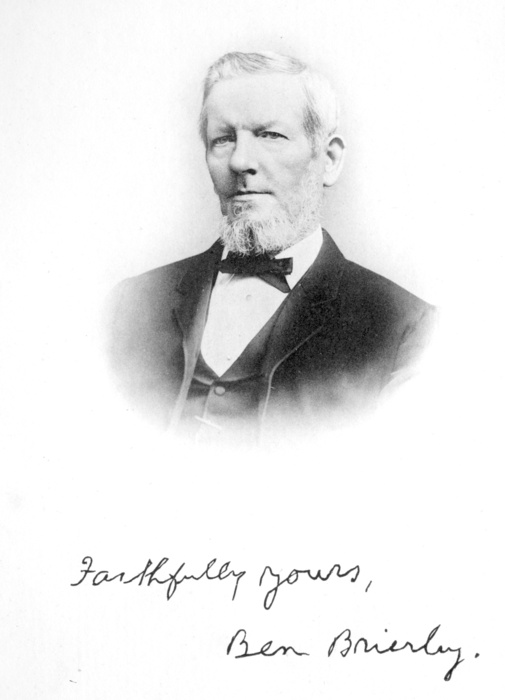 |
|
BENJAMIN
["Ben"] BRIERLEY (1825–1896),
poet and novelist.
Photographed
June, 1894. |
Ed.— in addition to the pieces
that appear below, JAMES DRONSFIELD
has written a good biographic sketch of Brierley, which
appears as the
Preface to AB-O'TH-YATE
SKETCHES, Vol. I., while Brierley
himself provides a similar piece in the chapter entitled "Failsworth"
in AB-O'TH-YATE
SKETCHES, Vol. III.
――――♦――――
From
THE OLDHAM CHRONICLE
June 27, 1925.
BEN BRIERLEY CENTENARY.
|
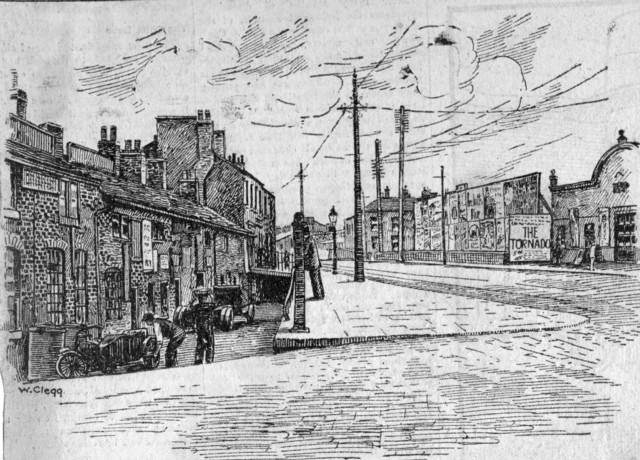 |
|
BEN
BRIERLEY'S BIRTHPLACE, AS SEEN TO-DAY. It is on Oldham Road,
Failsworth, between the Pole and the Canal Bridge. The actual house,
marked by a tablet, is the last on the left. Brierley wrote:—"This
hole (the space between the houses and the wall supporting the
raised footpath), called 'The Rocks' from its being walled with
stone, is wedge-shaped, and I was placed at the thin end. The upper
portion of the house has since been rebuilt and now forms a dwelling
of itself—the lower part now serving as a foundation." |
BEN
BRIERLEY was born at
Failsworth on June 26, 1825. He is therefore entitled by lapse of
time to have his centenary celebrated, and his friends and
neighbours have decided that it shall be. He was born at "The Rocks"
in Failsworth, but it must not be supposed that "The Rocks" stands
for some imposing residence. It was a mean looking birthplace,
scarcely fit for anyone to be born in. It was a bit of sunken
roadway left low down by the construction of the turnpike road to Austerlands which had to be carried over the Rochdale canal at a
higher level. A row of houses formed one side of the gully, facing a
heavy stone retaining wall which supported the upper road. Hence its
name. Ben was born in the end house, the dead end of what he
afterwards referred to as "this hole." The house is still there and
so is the gully and may seen to this day. A higher storey was added
to the house which opens on to the present highway. The place is
marked by a tablet affixed to the wall.
|
"Swinging, at first drowsily, as if they were not quite roused from
sleep, but growing louder and quicker as they opened their eyes, the
bells began their welcome to the New-born Year. How they chased each
other in the race of harmony! The little ones sometimes tumbling
over the big ones, the latter growling good-humouredly betimes at
the eagerness of their forward companions, and putting in their
ding-dongs like veterans who had rung-in many a New Year, and knew
what it was to go about their work soberly. But merrier still the
young ones grew, and got so frolicsome in their madcap glee, that
the old ones, as if resolving not to be outdone by their juniors,
fling away discipline altogether, and lumber away in the race like
giants at child-play. Away they go, helter-skelter, little and big,
old and young, light tones and deep, making such a row in that
bedlam of a steeple, that the spiders, frightened out of their wits,
retreat to the farthest nooks of their several lairs, and ponder
over the remains of murdered flies that strew the floors of their
airy charnel-houses."
New Year bells, from
Christmas at Ringwood Hall |
Ben was well provided for in the important matter of parents. His
father, James Brierley, had been a soldier, and had fought at
Waterloo, having two years added to his term by reason of that
service, with a pension increased accordingly. He was present as a
plain citizen at Peterloo as many other Failsworth people were. It
is probable that Ben inherited his erect figure and quick step from
his father. It is equally probable that he derived from his mother
his kind and gentle disposition. She had a wonderful influence over
the boy. She had a splendid voice and sang much in the home. He had
great reverence for her. Her name was Esther and so devoted was he
to her that he vowed he would never marry any woman unless she was
called Esther. And it was so, for in the fullness of time Esther was
found waiting for Ben.
Education.
Born in pre-education days his chances of schooling were of the
scantiest. There was a school round the corner in Pole Lane to which
he went. He was evidently an intelligent boy and a trier. He says of
himself at that age: "I was an apt pupil and rose from the A,B,C's
before I was five years old. I took the first prize in spelling. The
word to be spelt was 'victuals,' the prize three marbles. Victuals
was ever a hard word to spell and particularly at the time when Ben
was going in five. The marbles would be welcome even to a child so
young. It is worth noting that this facility in spelling
remained with him, and it was considered by good judges that his
spelling of dialect words was most correct. Possibly
Sam Bamford
might on some counts have run away with the marbles. Little Ben
stayed on at the Pole Lane Academy till Coronation Day when William
IV was crowned but left school the day after and never went to day
school again.
|
|
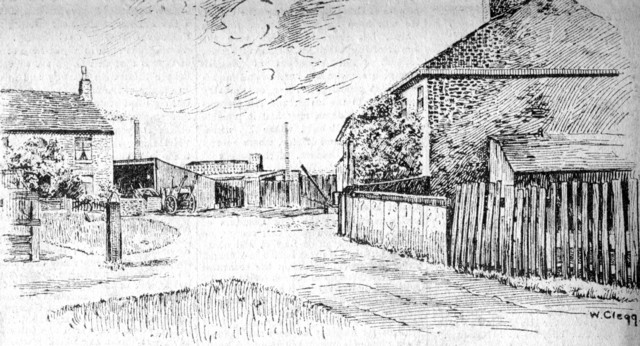 |
|
Bardsley Fold, off Lord Lane, Failsworth―Brierley's
Walmsley Fowt. The home of Ab o'th Yate
is on the right of the drawing. |
|
The family "flitted" to Hollinwood and one day a week he was put
under tuition at a Sunday School held in a garret in Bower Lane,
conducted by some excellent people irreverently nicknamed "Ranters,"
being somewhat loud in their declarations of faith. He was passed
into the Bible class before he had gone through the New Testament,
that being the order of the promotion. He took to reading, and
bought "Cleaves's Gazette," one penny weekly. Noticing this, a
reading man lent him "Pickwick Papers." He helped to form a mutual
improvement class and on returning to Failsworth joined a similar
class, there he read Burns and Byron, bought a Byron tie and took to
cultivating melancholy for the first and last time in his career. Brierley often remarked that he "had to make his own ladder before
he began to climb." But he did climb and became one of the goodly
company of the great self-taught.
Literary Instincts.
Brierley felt the stirrings within, which impelled him towards
literary effort. He was moved towards poetry and indited verses "On
the death of a little hen." That poem is not now in print and
probably never was. He tried drama and was driven to write a
play which must needs be a tragedy, "Marinello, the Monk," which was
staged under the direction of the author. There were daggers in the
play, and Brierley took one of the more dangerous parts. So well did
he act that Esther threatened to have no more to do with him as he was
"sich a bad un." This and other plays were staged upon three planks,
a window bottom and the top of a staircase, and the "tea-fed audience
were delighted."
|
"Th' fowt begun a-stirrin'.
Th' childer i' white—bless the'r little souls!—flyin'
abeaut like little angels. An' owd men i' black
cooats ut they'd worn eaut o' recollection, an' some, aw
dar'say, wur the'r feythers afore 'em, wur tryin' to put
th' childer i' a double row for t' receive th' Prince,
but it wur moor nur they could manage for a while,
becose th' childer mit ha' had wick-silver i' the'r
shoon. At last they geet 'em summat like streight,
an' as they o stood up, every little lass had a posey i'
her hont, an' it wur enoogh to mak' a lad wish he're a
wench, for a grander seet couldno' be pictur't.
Ther mony a mother lookin' eaut at th' chamber window,
tryin' to hide summat ut trembled in her e'en, as hoo
looked at a bit o' white deawn below. Ther one o'
eaur Ab's childer amung th' lot; an' th' owd gron-rib
thowt th' wench's mother mit ha' put a bit moor blue in
her starch, for th' frock wur th' colour of a primrose.
Mother-in-law agen! aw thowt. Dowter never con
pleeas."
Welcoming the Prince of Wales, from
Ab-o'th'-Yate
Sketches. |
Failsworth itself was a poor sort of place, it had just been rescued
from the heath. The soil was thin and surly, and swampy in places,
more fit to carry rushes than corn. Agriculture was in its primitive
stage. The farmsteads that were scattered at wide intervals over the
land were what would now be called "milk farms," with pigs and
poultry to make out with. The farmhouses were set in folds or, in
dialect "fowts," a term even now in common use. There are still
Hardman Fold, Fletcher Fold, and Bardsley Fold. The last named was
rechristened by Brierley for his own literary purposes and became
the famous "Walmsley Fowt," the abiding place of "Ab o'th Yate." The
few cottages that clustered in and about these fowts housed such
labourers and craftsmen as were needed for the services incidental
to farm life, carpenters, builders, smiths and the like. The other
principal industry was that of silk weaving carried on in cottage
loom houses. The people were of rugged speech and rough in manner. They had practically no education, and had to make the best they
could of their natural intelligence. They were given to such sports
as cock-fighting, dog fighting and bull-baiting with an occasional
bout of bear-baiting. Their social recreations centred largely in
the village ale-house and the "hush shop," which
flourished by hiding its light within a brewing mug.
|
|
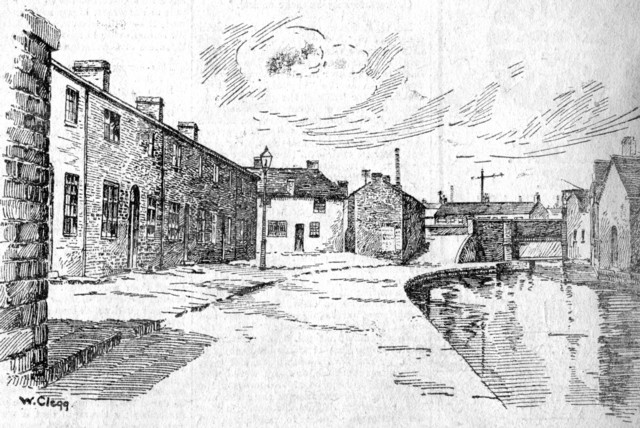 |
|
TH' CUT SIDE, off Hollins Road. Brierley lived in the
third house from the far end of the row for many years. Describing
this spot he writes:—"There was a farmhouse on the opposite side of
the canal. A spacious orchard, the trees in which were covered in
bloom, ran to the edge of the water. A thorn fence, well
grown, in which I looked for birds' nests was within a few yards of
the door. |
|
An Interesting Folk.
Into this community Ben Brierley was born; and considering what he
was to be and to do he could hardly have been born in a better
place. These men and women, their occupations and recreations, their
habits and associations, were the raw material of the literature
that was to be. He realised that the proper place to start the
business was where he happened to be. The men dressed in homespun or
moleskin, the women wore caps and bedgowns and shod themselves in
clogs. When the men went "a-buntin'" they brought out their best
tall hat, blue swallow tail, with shining buttons, knee breeches,
and shoon clasped with buckles the colour of silver. These humble
folk supplied what the very modern novelist would call "life." Brierley arrived just in time to see the boggarts go, the very last
of them. Men they were in shadowy grey, turning to a rusty black,
who had dealings "wi th' owd lad" seen and not seen, heard making
noises with or without chains. Ben Brierley's friends being
superstitious believed in them, or, rather, were much afraid of
them. Witches, too, there were—seen and conversible—who killed
cattle with a look, and brought fever to the village with a
mysterious word. They were often bent and old, and feaw of face,
dressed dinghy, and leaned upon a crooked stick. Boggarts and
witches came in and out of these tales investing them with the
dread of the occult. Brierley did not invent them, he found them
there in the popular mind as things that were veritable.
First Venture.
Ben Brierley's first serious venture in literature was "A Day Out,"
which appeared in the "Manchester Spectator." It was an
unpretentious piece of writing, merely an account of a simple
journey of observation, a walk through the fields, along the brook
side, through sloughs into the Nook which he made his own; talks by
the way, refreshing, invigorating conversation; encounters with
characters whose discourse had a racy energy which is chiefly found
in the quiet place of the countryside. In this record we seem to get
the plan of Brierley's literary design.
|
It seems that Brierley's better half wrote up
her household accounts in chalk, on the back of the
kitchen door. Thus, when Ab decided to carry out an
audit of her expenditure . .
. .
"Aw're never betther puzzled i' mi life nur when aw looked o'er this
wooden shop-book, an' tried to mak' eaut th' meeanin' o'th' figures
ut wur on it. Aw knew ut a o meant a shillin', an' a hauve-moon
six-pence. Aw knew, too, ut a lung choak stood for a penny, an' a
short un for a haupenny; an' ut an x wur a farthin'. Aw could add up
th' whul lot, an' knew heaw mich it coome to. But what had th' brass
bin spent on? Theere wur th' rub! Aw should ha' to co' in mi client
to explain."
Ben Brierley,
The Owd Buttery Dur, or
Ab's Audit |
There are in it the same kind of people who move through his later
writings. Owd Israel, who was a "fizzer at telling a tale," and that
other man who could "smell a pa'son a fielt off," and the other one
who described bad ale as "brewed besoms." This first real attempt at
literature was welcomed by the "Manchester Guardian," the
"Manchester Examiner and Times," and the far-off "Saturday Review." Those who think of Brierley as a writer in dialect only should read
"A Day Out," and they would find that he had a good command of
excellent English. His short sketches were full of good writing. In
"The Jacobin" he displays true narrative power. It is based upon an
incident which occurred in "The Rocks" at the turn of the centuries
when Tom Paine flourished as a bogey, and had the distinction of
being burnt in effigy at frequent intervals, amid signs of popular
execration. A simple weaver was suspected of having in his
possession a copy of "The Rights of Man." He was visited by a
military personage who demanded that the book should be delivered up
to him. The man retired into the house and returned with a copy of
the Bible. "What is that?" said the man of the sword. "The only book
of the rights of Man that I read," was the reply. And the mob that
had caused this domiciliary visit was sharply rebuked.
The Dialect.
But it was in the dialect that Brierley did his best work. His
characters are always talking, and that in the vernacular. It is in
their conversation that they reveal themselves. Some of them use
strange words not to be found in any dictionary. The words are "whoamly,"
because they are "whoam-made" intended for domestic use and seldom
stray from the neighbourhood. Not only are the verbs singular but
the nouns also, and some words that do not perhaps belong to any of
the parts of speech. What a world of meaning can be thrown into "Theigher." How "gloppent" leaves one wondering. And "gullook"
can only be guessed at. "Seechin' for gawp seed" is a sentence that
is hardly amenable to ordinary parsing. "Keawer thi deawn while aw
pow thi yure" is difficult when written, impossible when spoken
except to the knowing ear. "Threapin', " "thrutchin'," "hutchin'
up," were terms in daily use which modern refinement has not yet
suppressed. Of these "gradely" is the most distinguished word. It is
of such words that the characters in Brierley's writings make up
their conversation.
|
|
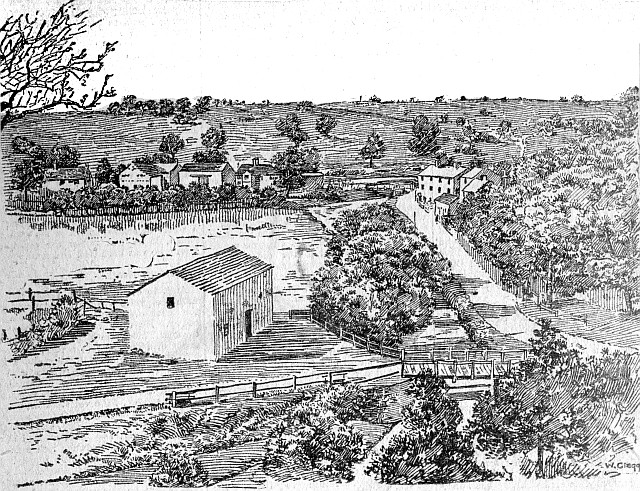 |
|
DAISY NOOK, as seen from the Droylsden side. A
survey of Brierley's life and writings would be incomplete without
reference—pictorial or otherwise—to the still charming spot in the
Medlock Vale popularised by his tales and sketches. |
|
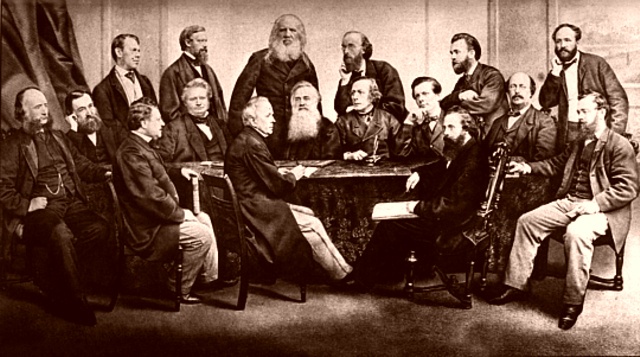 |
|
Meeting of the
Manchester Literary Club c. 1865.
Samuel Bamford is third from
the left,
back row; Brierley is seated fourth from the right,
centre row; Edwin Waugh is seated on
the extreme right. |
|
Lancashire Humour.
Brierley's strong point was his humour. It was the
Lancashire variety he dealt in, and that means particularly the
humour of the countryside. It was jovial and jolly. When
it laughed it opened its mouth and guffawed without thinking that it
might be ill-mannered. With Brierley it sometimes took the
form of the practical joke, often of the "biter bit " variety.
One of his most interesting characters was "Fause Juddy," a very
good fellow, who might, however, be easily taken in. This was
he who figures so amusingly in "Catchin' a Weasel," one of
Brierley's best tales. It turned on the occurrence of the
first of April. "Ab" himself, having been made into a "foo,"
set out to find another, and found an easy victim in Juddie.
The story is dramatically perfect. "Th' Boggart o' th' Stump"
is another rollicking sketch. The purchase of the stuffed
monkey and its installation on a stump by a field path might be
expected to provide fun. Joe and Bill stood and stared at they
knew not what. It was a hare, a cat, a scorpion, a cherubin,
all in turn. Then it was "Th' Owd Lad," and there was nothing
for it but flight. The same impression struck the vow-making
swain who left his trusting girl at sight of "Jacko," ran down the
hill, but not too far to prevent his calling out "Tak' her, Mesthur
Sattin, hoo mends stockins' ov a Sunday."
Dramatisation.
Brierley dramatised several of his stories, "Thistledown
Hall," "The Cobler's Stratagem," "Fratchingtons of Fratchingthorpe"
and "Insurin' his Life." But his greater success in this
direction was "The Layrock of Langleyside." As "The Lancashire
Weaver Lad" it succeeded in passing the ordeal of the legitimate
stage, being performed at the Theatre Royal, Manchester, Brierley
himself taking the part of the weaver. As an actor he showed
good talent and delineated his own characters in a realistic
fashion. Incidentally it illustrated at once his poetic merit
and an unsuspected musical ability. There is a song in this
drama which the weaver sings, with a chorus which calls for much
sprightliness from the singers. Here is a stave, or two:
|
Yo' gentlemen o' with yor heawnds and yor parks,
Yo' may gamble and sport till yo' dee-e,
Bo' a quiet heawse-nook, a good wife an' a book
Is more to the likin's o' me.
Aw care no' for titles, nor heawses nor lond,
Owd Jone's a name fittin' for me.
An' gie me a thatch wi a wooden dur latch
An' six feet o' greawnd when a dee-e.
Chorus:
Wi' mi pickers and pins
An' mi wellers to th' shins,—
My linderins, shuttle and yeald hook,
Mi treddles an' sticks,
Mi weight-ropes and bricks,
"What a life," said the weaver o' Well-brook. |
To the unskilled person the chorus is almost unreadable, certainly
unsingable, but Brierley could get out of it all that he had put
into it.
His mastery of the humorous spirit was shown in the sketches
which followed the discovery of "Ab o' th' Yate," perhaps his most
successful delineation. They went together to Blackpool, to
London, sailed to the Isle of Man, and visited the United States,
leading a rollicking life together. "Owd Ab" was both humorist
and philosopher, and these journeyings of his were tours of
observation in which he gathered up not so much information as
impressions. As a critic he could be very caustic. On
shams and hypocrisy of every shade and kind he was severe and, on
occasion, almost fierce, but he was of charitable disposition,
considerate, and tolerant of mere differences of opinion.
Honesty and sincerity he demanded.
Journalist and Novelist.
Brierley was associated with journalism and was sub-editor of
the "Oldham Times " for some years. He ventured into London as
most authors are tempted to do. Many of his sketches and some
of his novels, "Red Windows Hall" being one, appeared in the
supplement to the "Manchester Weekly Times." His big venture
was the publication of "Ben Brierley's Journal," which continued for
a period of sixteen years. It was a popular production.
Brierley's literary ambitions never soared very high. He was
content to turn into literature the simple lives and experiences of
the humble people he knew so well. He never wandered far away
from his own place either for his Lancashire subjects, characters or
plots. Geographically he covered little ground.
Middleton and Tandle Hills across to Bardsley and Littlemoss
embraced the whole of his country. Yet within this narrow
space he found the materials for half a score or so of goodly
volumes including a volume of poetry with the title of "Spring
Blossoms." He was a lover of Nature, fond of gardens and
flowers and the still life of the country. He delivered an
"Oration" to the Ashton-under-Lyne Horticultural Society. That
was in the day when orations were still a fashion.
As regards his position in Lancashire literature, Ben
Brierley was the middle figure of the Lancashire trinity standing
between Waugh and
Laycock. As a prose writer
he is not much below Waugh in merit, as a poet he does not come up
to Laycock. His achievement was that he took of the simple
things of humble life and put them in a literary setting where they
will be permanently enshrined. They are a record of things
that were. He has done for Failsworth in his own modest way
what Barrie did for Thrums and Hardy for Wessex. For this he
is to be had in affectionate remembrance.
――――♦――――
|
ANNIE,
ONLY CHILD OF BEN.
AND ESTHER BRIERLEY;
Born November 7th, 1856. Died June 13th,
1875. |
|
WE thought she
was our own for yet awhile;
That we had earned her, by our love, of Heav'n,
To be a life's comfort, not a season's smile,
Then tears for ever. "'Tis to be forgiven,"
We deemed her mortal—not an angel sent
From out a mission host, on mercy bent.
We were beguiled by her sweet ways of love—
The growth of her affections round two stems—
As if they were of her, and from above,
We did not note that from her heart the gems
Of her devotion were bestrewn in show'rs
Where'er she went, and gathered like spring flowers
And her last words (coherent)—"I have lived,
And have not lived"—were full of earthly tone
And utterance. They, too, our hearts deceived;
Nor were we mindful till, when left alone,
We heard the flutter of a dove-like wing,
And a sweet strain, such as the seraphs sing.
Then knew we she had come in mortal guise,
To teach us love, and charity, and grace;
With sun-gold in her hair, heaven in her eyes,
And all that's holy in her preaching face.
The scales had fallen, and our vision then
Saw that an angel graced the homes of men. |
――――♦――――
|
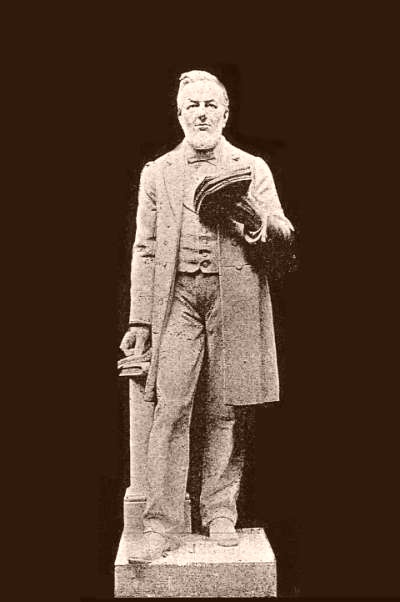 |
|
The Brierley statue in
Portland stone by John Cassidy,
above, was destroyed during the 1980s. |
BEN BRIERLEY
("Ab-O'th'-Yate ").
BORN JUNE 26th, 1825.
DIED JANUARY 18th, 1896.
|
THREE voices now are hushed; three singers sweet
Are gone to sing their stirring songs elsewhere —
Waugh, Laycock, Brierley. Now, methinks, they greet
And mingle voices in yon happier sphere.
Each one a son of toil, a child of song,
Has added to his county's fair renown;
Has striven to make his fellows pure and strong,
And worthily has worn the poet's crown.
Not least, though last to go, we mourn to-day
Fun-loving, mirth-provoking Ben, whose mind
Was like a child's — transparent, yet relined,
And whose creations cannot pass away.
Now by his darling's side lay him to rest,
And may each mourner feel that God knows best.
David Lawton |
――――♦――――
THE GUARDIAN
May 2, 1898.
THE BEN BRIERLEY STATUE.
UNVEILING AT QUEEN'S PARK.
MR. G. MILNER ON DIALECTAL WRITERS.
The statue erected in Queen's Park as a monument to the late
Ben Brierley, the famous Lancashire writer, was unveiled on Saturday
by Mr. George Milner, chairman of the Committee who have had the
project in hand. A description of the statue has already
appeared in our columns. In spite of rainy weather, a large
crowd of people thronged the space in front of the main entrance to
the Museum in order to witness the unveiling ceremony. This
was shortened somewhat because of the rain, and it was arranged to
hear the chief speeches afterwards indoors. Sir W. H. Bailey
took the chair on a temporary platform and he explained that he did
so in the absence of the Lord Mayor (Mr. Alderman Gibson), who was
unable to attend owing to indisposition. The Lord Mayor had,
however, written a letter in which he said: "I should have liked by
my personal presence to testify my appreciation of a man who in his
day did so much to brighten the lives and make happier the homes of
the masses of the people."
Mr. George Milner expressed his sense of the honour done him
in asking him to unveil the statue, and he attributed the selection
to the fact that he was chairman of the Monument Committee and also
chairman of the Manchester Literary Club, of which Brierley was one
of the founders and at his death one of the vice presidents.
He would ask why they were there to unveil that monument.
Because Benjamin Brierley was a great and voluminous writer, at any
rate so far as what they called the Lancashire dialect was
concerned, and he was a man who had a very wide circle of readers
and admirers. In proof of that he need only say that the idea
of that statue was only made public on the 3rd September, and so
large and generous was the immediate support given that by the
present date they had the statue completed. Though he knew how
Mr. Brierley was esteemed by the Lancashire people, he was not
prepared for the way in which the people, and especially the poorer
people, came forward to help in the setting up of that monument.
It was because Brierley was a dialectal writer of eminence that they
put up the statue, but it was also because he gave a noble example
of what a poor man, suffering from absolute poverty and even
starvation in his youth, could do to get himself such an education
as Brierley got. He was a typical Lancashire man; he had a
typical Lancashire character for downright outspokenness—character
involving great love of independence. Brierley was, in fact,
like his own "Weaver of Wellbrook," in that old song, which many of
them knew—
|
Aw care no' for titles, nor heawses nor lond,
Owd Jone's a name fittin' for me.
An' gie me a thatch wi a wooden dur latch
An' six feet o' greawnd when a dee-e. |
They had given Brierley the six feet of ground he asked for
in the graveyard near that spot, but they also gave him help while
he lived. Now that he was dead they gave him what would be
found to be a noble statue.—Mr. Milner then unveiled the statue amid
applause. He added that he believed it would be an honour and
credit to Manchester. Those who knew Brierley said it was an
admirable representation of him, and he hoped it would long
perpetuate the name and fame and memory of the sturdy Lancastrian
whom it represented so excellently, and that future generations of
working men and women, seeing the honour that had been conferred on
one of their own class and order, might find in it an incentive to
resolute and self-denying service labour in that pursuit of
knowledge which always brought its own exceedingly great
reward.—(Applause.)
|
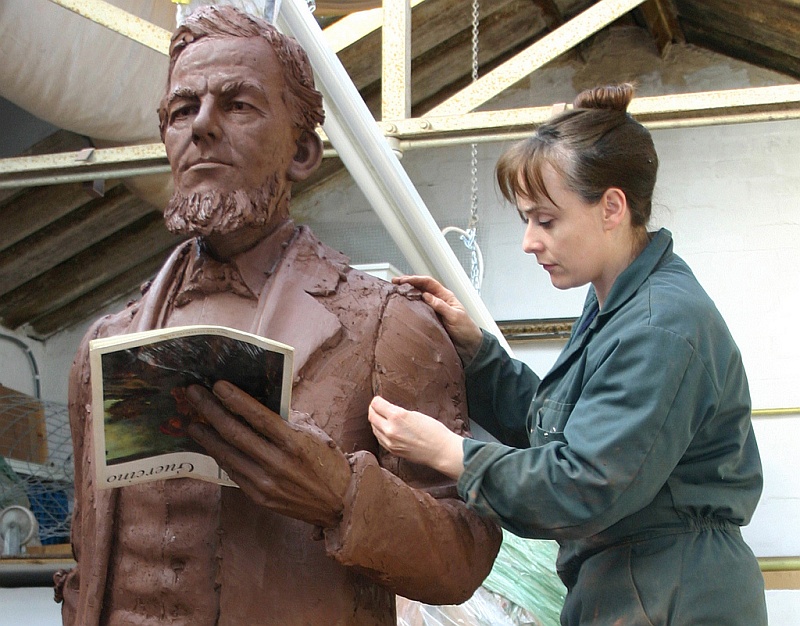 |
|
Denise Dutton putting the finishing touches to Ben Brierley in her
Stoke studio.
Photograph by kind permission of
Ted McAvoy.
|
|
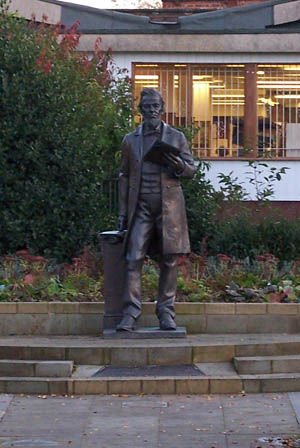 |
|
Ben
Brierley in bronze by Denise Dutton,
unveiled at Failsworth in 2006. |
|
――――♦――――
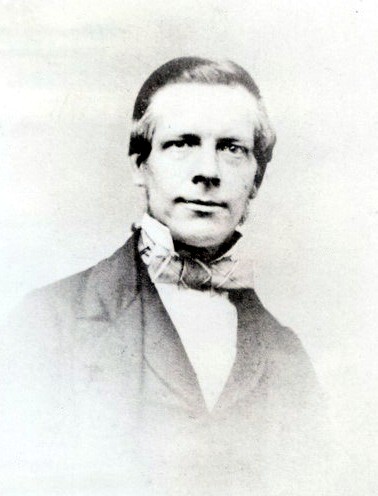
BIOGRAPHICAL SKETCH
FROM Momus, 1879.
A GALLERY of
Lancashire worthies would be indeed incomplete without the
well-known features of Ben Brierley, whose name is a "household
word" in every home, and whose individuality is a type of Lancashire
pathos and humour with all its quaint conceits and dialectic
mannerisms. He has achieved his popularity not only by
voluminous literary work, but by a large-hearted and discreet
philanthropy that endeavours to elevate the class from which he
sprung by calling attention to its wants and grievances, and at the
same time instilling those habits of self-help and self-control,
without which all charitable organizations are simply worthless.
Mr. Brierley was born at the Rocks, in Failsworth, June 26th,
1825. He attended the school in that village till his sixth
year, when his parents, who were in very humble circumstances,
removing to Hollinwood, little Benny lost the advantages of a day
school, his services being required at the bobbin-wheel. But
to him who is bent on self-improvement, difficulties are only
obstacles to be surmounted, and at the Hollinwood Night and
Primitive Methodist Sunday Schools, our hero was grafted in the
rudiments of the three R's, and such was his love for reading, that
at the very early age of seven, he had read his bible through no
less than three times. In 1840 he returned to Failsworth Old
School, and was instrumental in forming a Mutual Improvement
Society, which proved to be the germ of a Mechanics' Institute.
To an uncle, who was a leading spirit in that school he owes his
introduction to Shakspere, Byron, and Shelley, the perusal of whose
works had a marked effect on his future career,
|
"And lured him on to those inspiring toils
By which man masters men." |
At any rate, about this time his "muse began to labour," and
one of the very first deliveries was a sketch entitled "My uncle's
garden," commemorative of the Sunday mornings spent therein happy
and edifying conversation, which was, as Brierley says, something to
be remembered for a lifetime. This sketch was published in
1849, in the supplement of the Manchester Spectator; but his
labours, consecutively as hand-loom weaver, piecer, and silk warper,
prevented him for some time from following the bent of his
inclination. When we state that for nine years he had to walk
to and from his work nine miles each day our readers may imagine he
had but little time for the cultivation of his literary faculties,
and it was only during those peregrinations to and fro that he could
find time to indulge in reading, which had now become one of the
necessities of his existence. In 1855 he married; and, shortly
afterwards, work in his branch of trade failing, accepted the
sub-editorship of the Oldham Times, but left that situation
in 1862, having obtained a short engagement in London. During
his stay in the metropolis he was introduced to the Savage Club, and
made the acquaintance of the Brough Brothers, Andrew Halliday, Tom
Robertson, and other well-known dramatic celebrities. When
Colman's Magazine, which had been started by members of the
club, collapsed, Mr. Brierley returned to Manchester, where he has
since resided, settling down as an author and reader of his own
works, in both of which capacities he has achieved a popularity
second to no man in the county. The library of a Lancashire
home would indeed be incomplete without the works of Ben
Brierley—his unadulterated patois being alike relished by his
readers and hearers throughout the whole Palatinate.
Mr. Brierley's married and literary career may be said to be
co-existent, for in 1855 was written "Jimmie the Jobber" a little
story which he submitted to a friend, who strongly advised him not
to publish it; but, stimulated by the success of Edwin Waugh, whose
"Come whoam to thi
childer an' me" had about that time rendered its author famous,
he resolved to publish it in one form or another, and the sketch
appeared in the Manchester Spectator, and, being afterwards
published in book form, had a good sale, as had also his succeeding
ventures. His success led to his introduction to the editor of
the Weekly Times, and he at once commences to write for the
supplement of that journal. But strong as was Brierley's
attachment to journalistic literature, his love of the drama was
still stronger; and, aspiring to histrionic honours, be produced a
dramatic version of his "Layrock of Langleyside," in which he
himself played the principal part, and achieved a decided success as
an impersonator of Lancashire character. As an author, Mr.
Brierley possesses the qualifications of genial humour and touching
pathos; and his early associations have given him a grip of his
subject of which he has not been slow to avail himself, his mind
being quick to appropriate those quaint oddities of Lancashire life
which his keen eye is ever ready to detect.
A turning point in his life was the institution of Ben
Brierley's Journal, which attained great popularity, and a
marvellous circulation, the "gude fowk" of Lancashire being
delighted with the bright and healthy stories, written in their own
idiomatic language, and with a grasp of their social characteristics
which an intimate acquaintance can alone evolve. Though Ben's
poetry is overshadowed by his prose, he has an undeniable poetic
temperament, and some of his shorter pieces are real gems. In a
short sketch like this we cannot enumerate his multitudinous works
which, if we mistake not, have been published in a complete form in
some fifteen or twenty volumes.
In the November of 1875 Mr. Brierley was elected a City
Councillor, and although his candidature had been almost regarded as
a joke, Ab'-o'th'-Yate was not long in proving to his constituents
that their confidence had not been misplaced. His maiden
speech was in support of the Free Libraries Committee's successful
attempt to prevent the Reference Department being located in the
attic of the New Town Hall. The peroration will be long
remembered by the parody on Longfellow's "Excelsior," the concluding
lines of which were as follow—
|
"Oh! what would Grundy say, or Lamb,
If, without aid of 'bus or tram,
They sought up there their heads to cram?
All right Excelsior—but d—n
The Town Hall Stairs." |
On resuming his seat, amid shouts of laughter and applause,
Alderman Lamb rose to reply, but confessed it required considerable
nerve to follow the new councillor. Ben Brierley had made his
mark, and the first vacancy found him one of the Free Libraries
Committee. His municipal experiences, more especially in
connection with the Nuisances Committee, led him to raise the
question "What shall we do with our poor?" No man was better
qualified to give an opinion on the subject, and the dailies, by
ventilating the question, proved that he had hit the right nail on
the head. The Artisans' Dwelling Act, although shelved by the
Health Committee, was another instance of Brierley's sympathies for
the humbler classes; and his letter on the "Domestic Economy
Congress," entitled A Flourish of Trumpets, was described by
a well-known barrister as a "skinner."
His sphere of usefulness may be most aptly described by the
fact that he has, during his municipal career, served on a greater
number of Committees and Sub-Committees of General purposes, than
perhaps any other member of the Corporation, viz: "Nuisances,"
"Hackney Coach," "Lamp and Scavenging," "Free Libraries," "Parks and
Cemeteries," and "Baths and Wash-houses Committees," Public Rooms
and Printing and Stationery Sub-Committees."
Here is an amount of work of which any Councillor may well be
proud; but in addition to this Mr. Brierley, in connection with the
relief organisations during the past winter, assisted on the
platform in no less than twenty-two entertainments, his services
always being gratuitous, even to the payment of his personal
expenses.
Such a man may well be popular, and when Ab'-o'th'-Yate
crosses the Atlantic, on a visit to our American cousins, during the
ensuing autumn, and such I believe is his intention, thousands of
admirers will not only wish him God speed, but a quick return to the
old country—spots which his graphic pen has rendered dear to many a
town-dweller. I have before alluded to his dramatic instincts,
and may as well call attention to the fact that he, in conjunction
with his friend Mr. Dottie, will appear during the month of
September at the Theatre Royal, in his own drama of "The Lancashire
Weaver Lad." The occasion will be a most interesting one, and
no doubt advantage will be taken of such an opportunity to prove to
Ben Brierley the estimation in which he is held by his
fellow-citizens.
|
――――♦――――
|
AT MY DAUGHTER'S GRAVE.
ON HER NINETEENTH BIRTHDAY. |
|
NOVEMBER'S
chills hang in the sullen air,
The earth is shrouded in funeral gloom;
The trees around seem fretful, weird, and bare,
As here I stand beside thy silent tomb,—
My daughter!—loved alike by sire and friend—
Thy Mother's idol, thus to thee I bend!
It seems an age since last I saw thy face,
Smiling to make e'en death a loveliness;
And as the scalding tears each other chase
Down cheeks that ever must be flooded thus,
I feel 'twould be the prime reward of prayer,
To see the glory of thine eyes and hair.
Now cold's the hearth that once thy presence warmed;
Dark is the room of which thou wert the light;
Silent the music which my soul hath charmed,
When home, and wounded, from the world's stern fight.
Thy stool—thy chair—the couch—all vacant now—
Cry through the darkness—"Annie, where art thou?"
Thy mother nightly lingers at the gate,
To watch thy coming; and as pale the lights,
She says—"How long—how very long—to wait!
Such girls as she should not stay out at nights.
All her companions are in bed ere this,
And I'm still waiting for her 'good night' kiss."
This day thou would'st have marked thy nineteenth year;
A day looked forward too long months ago;
That should have brought to us, nor sigh, nor tear,
But such sweet joy as only parents know.
Who could have dreamt, or felt the galling fear,
That thou would'st hold thy birthday revels here?
A bridal wreath bedecks thy marble brow;
The robes* enwrap thy form that should have swept
The path which leads to where we plight the vow
Of love eternal—broken oft, or kept.
If shades commingle 'round thy hallowed bed,
Then thou'lt beseem the bridals of the dead.
Ah, frenzied dreams—ah, visions wild and strange,
That haunt for aye this wilderness of air!
If in the great, inevitable change,
Thou, God, seeth fit to show Thy mercies where
Love's blossoms are by thousands largely shared,
This garden of one flow'r Thou might'st have spared.
They who would tell me life is but a span
Know not affliction—not the loss of thee.
'Tis woe, laid heavy on the soul of man,
That makes of time a drear eternity.
Life's sunniest moments fly the swallow's flight,
But oh, how slowly creeps the hours of night!
Great God! whose Will it was to take away
The only lamb that nestled in our fold—
If through His tears who wept on Calvary
The dear one's face we may again behold;
Oh, let thy messenger of love descend,
To give assurance such shall be the end!
My pray'r is heard, a voice from out the clouds
Proclaims in trumpet clangour to the dead
"Arise ye, shake ye off your mortal shrouds,
And put on Heaven's eternal robes instead!"
I feel the flutter of an angel's wing
And hear Heaven's choir their sweet Hosannas sing.
The vision's past; the gloom is thickening round,
The mists enwrap me with an icy fold.
But here my soul hath its best solace found,
And turned to summer warmth the wintry cold.
Thus, hoping, dear, thy face again to see,
I weave those immortelles of song to thee!
Ben Brierley |
|
* She was buried in
full brides-maid's costume, intended to have been worn at the
wedding of a cousin. The poor girl begged of her mother, a
few days before she died, that she might be allowed to wear the
dress on the wedding-day, if not able to attend the ceremony.
The request was complied with; it served for her shroud. |

<>
|